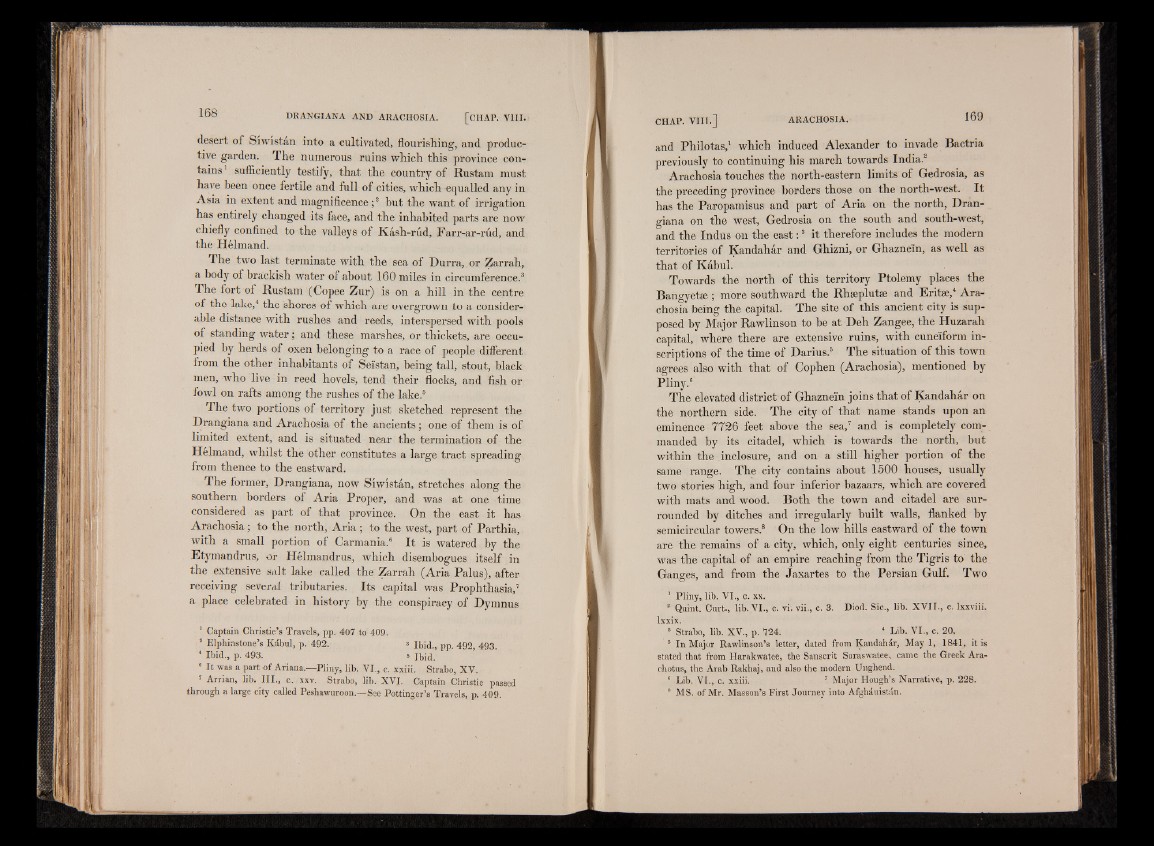
desert of Siwistan into a cultivated, flourishing, and productive
garden. The numerous ruins which this province contains1
sufficiently testify, that the country of Rustam must
have been once fertile and full of cities, which equalled any in
Asia in extent and magnificence;2 but the want of irrigation
has entirely changed its face, and the inhabited parts are now
chiefly confined to the valleys of Kash-rud, Farr-ar-rud, and
the Helmand.
The two last terminate with the sea of Durra,.or Zarrah,
a body of brackish water of about 160 miles in circumference.3
The fort of Rustam (Copee Zur) is on a hill in the centre
of the lake/ the shores of which are overgrown to a considerable
distance with rushes and reeds, interspersed with pools
of standing water; and these marshes, or thickets, are occupied
by herds of oxen belonging to a race of people different
from the other inhabitants of Seistan, being tall, stout, black
men, who live in reed hovels, tend their flocks, and fish or
fowl on rafts among the rushes of the lake.5
The two portions of territory just sketched represent the
Drangiana and Arachosia of the ancients; one of them is of
limited extent, and is situated near the termination of the
Helmand, whilst the other constitutes a large tract spreading
from thence to the eastward.
The former, Drangiana, now Siwistan, stretches along the
southern borders of Aria Proper, and was at one time
considered as part of that province. On the east it has
Arachosia; to the north, Aria ; to the west, part of Parthia,
with a small portion of Carmania.6 It is watered by the
Etymandrus, or Helmandrus, which disembogues itself in
the extensive salt lake called the Zarrah (Aria Palus), after
receiving several tributaries. Its capital was Prophthasia,7
a place celebrated in history by the conspiracy of Dymnus
1 Captain Christie’s Travels, pp. 407 to 409.
2 Elphinstone’s Kdbul, p. 492. a ibid., pp. 492, 493.
4 Ibid., p. 493. « ibid.
' I t was a part of Ariana.—Pliny, lib. VI., c. xxiii. Strabo, XV.
7 Arrian, lib. III., c. xxv. Strabo, lib. XVI. Captain Christie passed
through a large city called Peshawuroon.—See Pottinger’s Travels, p. 409.
and Philotas,1 which induced Alexander to invade Bactria
previously to continuing his march towards India.2
Arachosia touches the north-eastern limits of Gedrosia, as
the preceding province borders those on the north-west. It
has the Paropamisus and part of Aria on the north, Drangiana
on the west, Gedrosia on the south and south-west,
and the Indus on the east:3 it therefore includes the modern
territories of Kandahar and Ghizni, or Ghaznein, as well as
that of Kabul.
Towards the north of this territory Ptolemy places the
Bangyetse ; more southward the Rhseplutse and Eritse,4 Arachosia
being the capital. The site of this ancient city is supposed
by Major Rawlinson to be at Deh Zangee, the Huzarah
capital/where there are extensive ruins, with cuneiform inscriptions
of the time of Darius.6 The situation of this town
agrees also with that of Cophen (Arachosia), mentioned by
Pliny.6
The elevated district of Ghaznein joins that of Kandahar on
the northern side. The city of that name stands upon an
eminence 7726 feet above the sea,7 and is completely commanded
by its citadel, which is towards the north, but
within the inclosure, and on a still higher portion of the
same range. The city contains about 1500 houses, usually
two stories high, and four inferior bazaars, which are covered
with mats and wood. Both the town and citadel are surrounded
by ditches and irregularly built walls, flanked by
semicircular towers.8 On the low hills eastward of the town
are the remains of a city, which, only eight centuries since,
was the capital of an empire reaching from the Tigris to the
Ganges, and from the Jaxartes to the Persian Gulf. Two
1 Pliny, lib. VI., c. xx.
2 Quint. Curt., lib. VI., c. vi. vii., c. 3. Diod. Sic., lib. XVII., c. Ixxviii.
lxxix.
8 Strabo, lib. XV., p. 724. 4 Lib. VI., c. 20.
5 In Major Rawlinson’s letter, dated from Kandahar, May 1, 1841, it is
stated that from Harakwatee, the Sanscrit Saraswatee, came the Greek Ara-
chotus, the Arab Rakhaj, and also the modern Uughend.
6 Lib. VI., c. xxiii. 7 Major Hough’s Narrative, p. 228.
8 MS. of Mr. Masson’s First Journey into Afghanistan.